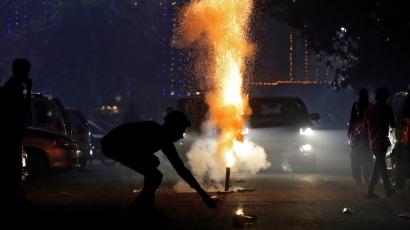People across India are preparing for Diwali, the Hindu festival of lights. They’re selling colorful lamps, cleaning and decorating homes, and buying clothes for the celebrations.
In the capital city New Delhi, residents are also preparing — by scrambling to buy air purifiers and protesting the use of firecrackers.
Diwali has created a persistent pollution problem in India for years. It’s typically celebrated with firecrackers, which contribute to already massive amounts of smog in many Indian cities — after last year’s Diwali, parts of New Delhi reported levels of pollution almost 40 times those considered “safe” by the World Health Organization (WHO).
Pollution also worsens at this time of year as temperatures drop and farmers use fire to clear land. The air quality index, which ranks pollution on a scale of 0 to 500, peaked at 256 on Thursday, classed as “very unhealthy,” before lowering to an “unhealthy” 183 on Friday.
This score reflects the concentration of dangerous microscopic pollutants, known as PM2.5, per cubic meter. According to WHO, an acceptable air quality index score for humans to breathe regularly is 25.
“We definitely have more sales during Diwali time when the pollution levels are high,” said Subhangi Soni, a sales representative at a New Delhi store that sells air purifiers. “Compared to five years ago, the sales of air purifiers are now double.”
Mohan Sharma, a manager at another store that sells purifiers, said sales increased “drastically” during Diwali.
Five years ago, “nobody even bought these products,” Sharma said. Now, the store sells about 25-40 purifiers in normal months — and around 100 purifiers during Diwali season.
The rise in sales may reflect greater public awareness of the problem — earlier this week, students across the country held anti-firecracker rallies. Many students wore face masks, held props like globes and respirator tubes, and held signs that read, “Let’s celebrate a pollution free Diwali” and “Burn your ego, not crackers.”
New Delhi authorities have this year only granted licenses to pyrotechnic vendors that are selling so-called “green” firecrackers, according to CNN affiliate CNN-News18. They’ve rejected applications from vendors who only sell traditional firecrackers with gunpowder and certain chemicals inside.
Other regions are also implementing restrictions — the northern state of Uttar Pradesh will only allow people to set off firecrackers in a two-hour window on the evening of Diwali, according to CNN-News18.
However, it remains to be seen how effective these measures will be. Last year, the Indian Supreme Court banned the sale of most firecrackers, although people continued to buy and use them.
Source: CNN





